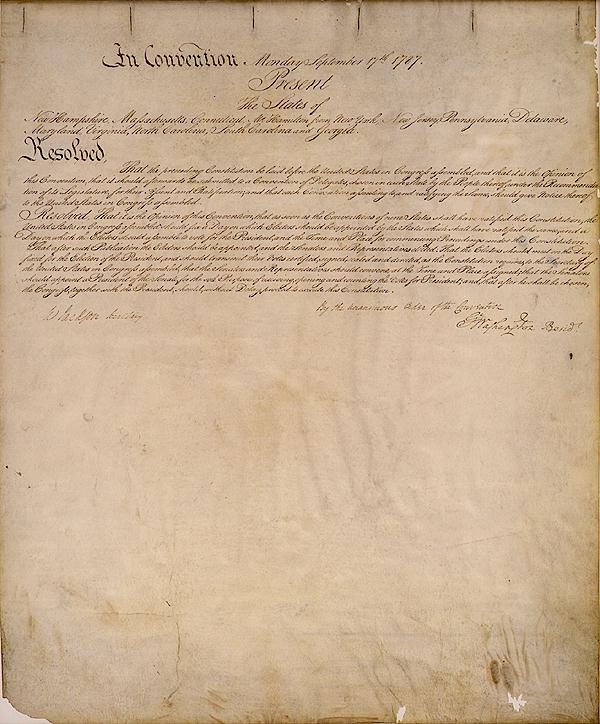
A Most Audacious Letter
Governments are instituted among men, deriving their just powers from the consent of the governed. Declaration of Independence
In February of 1787, Congress sanctioned a convention in Philadelphia “for the sole and express purpose of revising the articles of confederation, and reporting to Congress and the several legislatures, such alterations and provisions therein as shall when agreed to in Congress, and confirmed by the States, render the federal constitution, adequate to the exigencies of government and the preservation of the union.â€
The instructions were clear. The convention was to recommend changes to the Articles of Confederation, and submit them to Congress and the state legislatures for approval. Instead, the Federal Convention wrote an entirely new constitution—one that would dissolve the existing Congress and take away some state power. How in the world would they get this thing approved? It threatened every political figure in the country. The answer was simple. As stated in the Declaration of Independence, the Founders believed that all political power emanated from the people. They would bypass Congress and the state legislatures, and go directly to the people for ratification of their work.
There was a problem, of course. Congress and the state legislatures might not agree to being marginalized. The convention’s solution was to send Congress a letter. The first draft was a convoluted rationalization for their actions and a long winded declaration that their motives were pure. No one thought it was convincing, so in the end, they just told Congress what to do and how to do it.
In Convention Monday September 17th 1787.
Present
The States of New Hampshire, Massachusetts, Connecticut, Mr. Hamilton from New York, New Jersey, Pennsylvania, Delaware, Maryland, Virginia, North Carolina, South Carolina and Georgia.
Resolved, That the proceeding Constitution be laid before the United States in Congress assembled, and that it is the Opinion of this Convention, that it should afterwards be submitted to a Convention of Delegates, chosen in each State by the People thereof, under the Recommendation of its Legislature, for their Assent and Ratification; and that each Convention assenting to, and ratifying the Same, should give Notice thereof to the United States in Congress assembled.
Resolved, That it is the Opinion of this Convention, that as soon as the Conventions of nine States shall have ratified this Constitution, the United States in Congress assembled should fix a Day on which Electors should be appointed by the States which shall have ratified the same, and a Day on which the Electors should assemble to vote for the President, and the Time and Place for commencing Proceedings under this Constitution. That after such Publication the Electors should be appointed, and the Senators and Representatives elected: That the Electors should meet on the Day fixed for the Election of the President, and should transmit their Votes certified, signed, sealed and directed, as the Constitution requires, to the Secretary of the United States in Congress assembled, that the Senators and Representatives should convene at the Time and Place assigned; that the Senators should appoint a President of the Senate, for the sole Purpose of receiving, opening and counting the Votes for President; and, that after he shall be chosen, the Congress, together with the President, should, without Delay, proceed to execute this Constitution.
By the Unanimous Order of the Convention
Go Washington President
In less than three hundred words, the delegates instructed Congress on ratification and the mechanics for starting a brand new government from scratch. They didn’t just post this letter and hope for the best. Like politicians throughout the ages, emissaries from the convention met quietly with key members of Congress to grease the skids. Accommodations were made, and the delegates in Philadelphia knew in advance that Congress in New York would accept and act on the letter.
Despite the backroom bartering, this was still an extremely bold act. It was a bloodless coup that abolished a defective system and replaced it with a government devised by reason and debate, with guidance from the best philosophers in world history. Thomas Jefferson called the delegates, “an assembly of demigods.†That may have been an exaggeration, but they were certainly bright and capable. They were also committed. They didn’t leave until they had secured the blessings of liberty for themselves and their posterity.  It was important to them, and it should be important to us to continue their legacy.
James D. Best is the author of Tempest at Dawn, a novel about the 1787 Constitutional Convention.

 The posts are coming!
The posts are coming!

0 comments
Kick things off by filling out the form below.
Leave a Comment